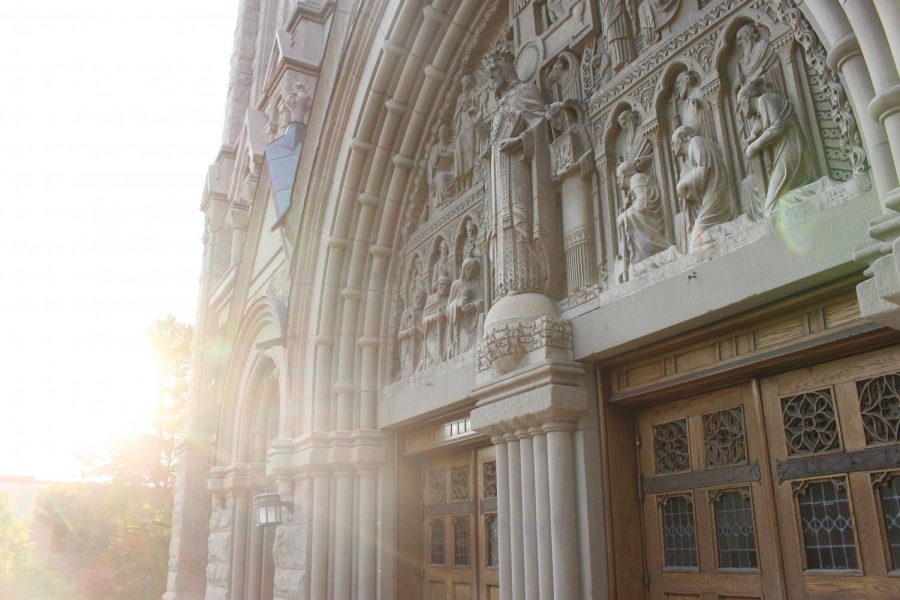Soter: Why Won’t Christian Leaders Say Black Lives Matter?
Cathedral of the Madeleine in Salt Lake City photographed on August 28th, 2020. (Photo by Gwen Christopherson | The Daily Utah Chronicle)
September 5, 2020
On May 25 of this year, in Minneapolis, George Floyd was brutally killed by a policeman, a civil servant who was supposed to protect him. His death, while tragic, was not surprising as he is one of the far too many Black people who have lost their lives to police brutality. This horrifying act of violence rightfully led to protests across the nation. But while millions of Americans risked their lives (quite literally, due to police violence and the current pandemic) to protest police brutality in the wake of Floyd’s murder, many religious groups have failed to maximize their great influence in terms of addressing racial inequities. Christian communities across the nation should actively support the movement for Black lives — a movement with the power to shift our country towards the unity Christians incessantly preach and America so desperately needs.
Here in Utah, the near silence of religious leaders and their communities in the face of the continuing struggle for racial equality has been deafening. The Church of Jesus Christ of Latter-day Saints — the predominant religion in our state — has had a problematic and controversial relationship with race since its establishment in 1830. In fact, the Book of Mormon itself contains racist ideas, with previous versions describing its righteous figures as “a white and delightsome people.” The Church’s trend of racial oppression continued well into the 20th century as it denied Black members access to LDS temples and Black men ordination to the priesthood until 1978.
Importantly, the church leaders originally ordained Black men to the priesthood without question; it wasn’t until 1852 that Brigham Young decided this would no longer be permissible. Young never said that he received a revelation from God about this new direction, nor did he say that it was a new doctrinal rule. Later, when the church announced that Black men once again would be allowed into the priesthood, they declared this change was a divine revelation from God.
And, while some argue that the church’s questionable roots were justifiable in the political context of the time, the NAACP recently announced that the Black community feels Church leaders have not done enough to reconcile their past, especially given the events of the past several months. In fairness, President Russell M. Nelson did forcefully address racial issues in a June speech in regard to the protests that broke out in Utah. But while Nelson condemned racist actions and attitudes in his speech, he stopped short of apologizing for his organization’s racist history or acknowledging the root cause of the anger a small number of protesters have unleashed. Instead, he chose to admonish them with a spin on the cliché, “Violence is not the answer.” That may be true, but this all started with systemic violence perpetrated by white people against people of color over generations. Couldn’t that warrant a violent response? Perhaps simply stating that “Black lives matter” would have said it all.
The Church of Jesus Christ of Latter-day Saints is not the only prominent faith where leaders are ambivalent in their response to the Black Lives Matter movement. Many religions need to do more to push the country towards positive change. It’s all in the numbers. For example, 6 in 10 Catholic Americans think police brutality against Black people is an “isolated issue.” In other words, the unjust murders we’ve seen in the last months have had nothing to do with the racist infrastructure our nation was founded upon. 7 in 10 Evangelicals share this view. These statistics demonstrate that racism is nurtured in many white Christian communities.
Of course, there are groups within the Christian world dedicated to encouraging clergymen and leaders to acknowledge and support an array of social movements. For example, Catholic Social Action recently published an open letter to Catholic clergymen asking for participation at the March on Washington held on August 28. This shows that there are people within these often socially insensitive Christian communities who are hungry for change. It’s only a matter of churches’ following their own doctrine, instead of being guided by the politics of the day, to create a country of peace, equality and unity.
It’s critical to keep in mind that the Civil Rights Movement was founded in large part on Christian doctrines by faithful leaders — like Martin Luther King, Jr., who once said, “The word of God is in my heart like burning fire shut up in my bones.” Now more than ever, Christians have a responsibility to revisit and act on the word Dr. King spoke of. Romans 2:11 reads, “For God shows no partiality.” A verse in Psalm 34 commands us to “Turn away from evil and do good; seek peace and pursue it.” And perhaps most relevant of all, Matthew 23 offers this wisdom: “Then Jesus spoke to the multitudes and to his disciples, saying, The scribes and the Pharisees sit on Moses’ seat. Therefore, whatever they tell you to observe, that observe and do, but not according to their works. For they say and do not do.”
Religion has power. For many, it offers a compass towards morality, and religious leaders spin that needle. The Church of Jesus Christ of Latter-day Saints and other predominantly white Christian communities need to continue fostering that virtue while directing it to racial justice efforts—because that’s the Christian thing to do.









